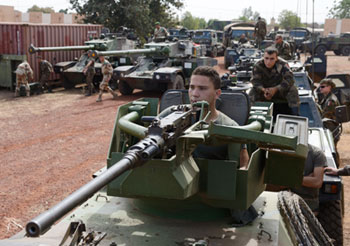
military regime.

Vol. 77/No. 3 January 28, 2013

|
| Eric Feferberg/AFP/Getty Images |
|
French troops head to battle zone in north Mali. French imperialists sent soldiers and bombers after Islamists took over most of former French colony, challenging control of military regime. |
As part of carrying out its objective, Paris, with some assistance from Washington and London, is buttressing a teetering government that came to power last March through a military coup.
The coup was led by soldiers who were trained by Washington as part of a military cooperation agreement with the previous government. The U.S. military was legally required to end training after the coup, according to several news sources.
At the same time key cities were seized in the north by two opposing forces: Tuareg rebels, who demand a secular independent state, and Islamist groups wanting to impose Sharia law. Months later Islamists pushed out the Tuareg group. The new government then requested military assistance from France as Islamist forces began heading further south.
French combat helicopters and fighter jets launched airstrikes in Mali Jan. 11, which were then expanded two days later into the northern Malian city of Gao, and along border areas with Mauritania and Algeria.
Paris has flown 400 French troops into Bamako, the capital city, and has another 150 special forces operating out of Mopti, a port city in the central part of the country. The French government said it plans to deploy 2,500 soldiers.
Among those being deployed are troops from the French Foreign Legion—paramilitary soldiers the majority of whom are foreign nationals who serve for the pay and a chance to gain French citizenship.
With economic and mining interests in the region, the French rulers have troops available for rapid deployment in the nearby countries of Burkina Faso, Chad, Gabon and Senegal.
Ground fighting has intensified as Islamist forces seized from the Malian army control of the town of Diabaly, 30 miles within government-held territory near the Mauritania border, three days after the French airstrikes began.
Military commander in chief Adm. Edouard Guillaud announced that French ground operations began Jan. 15, the Financial Times reported.
This operation will last “as long as necessary,” French President François Hollande told the media.
“Senior US and British officials expressed concern,” the Financial Times wrote Jan. 16, “that France’s military deployment in Mali could be challenged by jihadist fighters.”
Paris has asked Washington for military assistance, including aircraft that could be used to refuel French fighter planes in the air, logistical support and reconnaissance.
“The Obama administration moved [Jan. 13] toward approving a limited show of support for France’s military campaign in Mali,” reported the Journal, “readying surveillance drones and other air-intelligence assets for possible deployment within days.”
“Small numbers of U.S. troops might be sent to Mali and surrounding countries,” unnamed Defense officials told the Los Angeles Times, but “they would be limited to a support role.” Paris has asked Washington for help in moving another 500 to 600 French troops and equipment into Mali and the surrounding region, the paper reported.
British Prime Minister David Cameron has agreed to send two transport aircraft to help move French equipment into the region.
In December the U.N. Security Council had voted to authorize military action against Islamist groups in northern Mali. The Economic Community of West African States then agreed to send 3,300 troops there, but ground operations were not scheduled to begin until September. Now these forces are being rapidly assembled.
On Jan. 12 the president of the Economic Community of West African States commission, Kadré Désiré Ouédraogo, said the group had authorized an immediate deployment of troops, according to news reports.
Nigeria has already sent several hundred troops to Mali’s capital. The governments of Burkina Faso, Niger and Senegal have also announced plans to send 500 soldiers, reported Reuters. The government of Algeria is allowing French combat aircraft to fly through its airspace to bomb targets in Mali.
Mali’s interim President Dioncounda Traoré declared a state of emergency across the country Jan. 11.
According to the U.N., 30,000 people have fled the fighting over the past week, in addition to more than 200,000 displaced over the past year.
Front page (for this issue) |
Home |
Text-version home